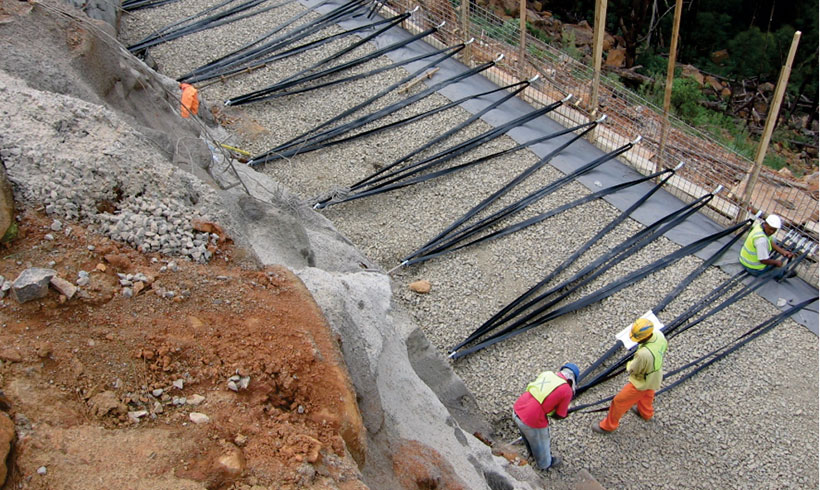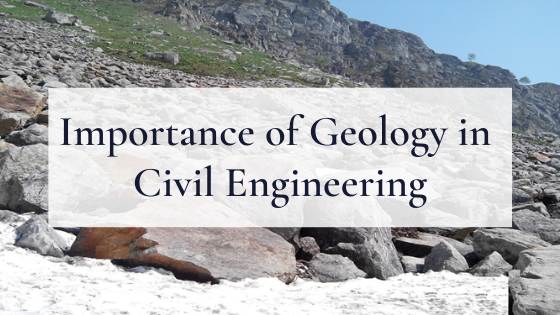Specialized Geotechnical Engineering Solutions Fundamentals Explained
Specialized Geotechnical Engineering Solutions Fundamentals Explained
Blog Article
What Does Specialized Geotechnical Engineering Solutions Mean?
Table of ContentsSpecialized Geotechnical Engineering Solutions Can Be Fun For EveryoneAn Unbiased View of Specialized Geotechnical Engineering SolutionsWhat Does Specialized Geotechnical Engineering Solutions Do?Specialized Geotechnical Engineering Solutions for Dummies
They perform website examinations, accumulate examples, perform lab examinations, and evaluate information to assess the viability of the ground for construction jobs. Based upon their findings, geotechnical designers provide recommendations for foundation layout, incline stability, preserving frameworks, and reduction of geotechnical hazards. They collaborate with other specialists, such as engineers, architectural designers, and construction teams, to guarantee that geotechnical factors to consider are incorporated right into the general job layout and application.
Structure Layout: Geotechnical designers play a vital duty in developing foundations that can securely sustain the desired framework. They analyze the soil problems and lots requirements to determine the suitable structure kind, such as shallow structures (e.g., grounds), deep structures (e.g., heaps), or specialized strategies like soil renovation. They take into consideration factors such as settlement limits, bearing capacity, and soil-structure interaction to develop optimum foundation designs.
Specialized Geotechnical Engineering Solutions - An Overview
Here are some kinds of geotechnical engineers: Structure Engineer: Structure engineers specialize in designing and analyzing structures for structures - Specialized Geotechnical Engineering Solutions. They analyze the dirt conditions, lots demands, and site features to figure out the most suitable foundation kind and design, such as superficial foundations, deep foundations, or specialized strategies like stack structures
They carry out area testing, gather samples, and analyze the gathered information to define the dirt buildings, geologic developments, and groundwater conditions at a website. Geotechnical Instrumentation Designer: Geotechnical instrumentation engineers concentrate on monitoring and determining the actions of dirt, rock, and structures. They mount and keep instrumentation systems that check elements such as dirt negotiation, groundwater levels, slope motions, and structural displacements to examine efficiency and provide early warnings of possible issues.
In the office atmosphere, geotechnical designers make use of specialized software application devices to perform computations, develop layouts, and analyze information. Specialized Geotechnical Engineering Solutions. They prepare reports, review job specs, connect with customers and group members, and coordinate project activities. The office setting supplies a conducive atmosphere for study, evaluation, and cooperation with various other experts associated with the project
They frequently check out job websites to perform site investigations, evaluate geotechnical conditions, and gather data for analysis. These brows through involve traveling to various areas, in some cases in remote or challenging terrains. Geotechnical designers might perform dirt sampling, conduct tests, and screen building activities to make sure that the geotechnical elements of the project are being executed correctly.
Specialized Geotechnical Engineering Solutions for Dummies
Geotechnical engineers additionally operate in specialized geotechnical laboratories. In these facilities, they carry out experiments, do examinations on dirt and rock samples, and examine the engineering homes of the products. Geotechnical research laboratory designers work thoroughly in these environments, taking care of testing tools, operating tools, and tape-recording information. They collaborate with other research laboratory personnel to ensure precise and reputable screening results.
Preserving Walls: Developing walls that keep back dirt to this hyperlink avoid landslides and give stability on sloped terrains. Embankments and Earthworks: Designing embankments for roadways, trains, and dams to ensure they remain steady under anxiety. The mining industry depends heavily on geotechnical design to guarantee the safety and security and long life of its procedures.
With this in mind, we have actually developed our program to prepare trainees for success. Geotechnical designers are entailed in all phases of the design of frameworks, from concept to construction. Their job is crucial in the style and planning procedure as they assess the integrity of dirt, clay, silt, sand, and rock, prior to building and construction starting.
The Single Strategy To Use For Specialized Geotechnical Engineering Solutions
This is followed by a ground investigation based upon the findings of the desk research study and involves test pitting and sampling to discover any kind of potential concerns. Geotechnical designers work within multidisciplinary teams, supported by intermediate and younger engineers as well as by CAD service technicians. As an elderly geotechnical engineer on a hydro plant job, jobs might consist of participating in technological reviews (e.g., peer reviews), tailings dam assessments, dam safety and security reviews, and other studies connected to the style and building and construction of mine waste facilities.
While some experts specialise entirely in geotechnics, others may work under titles like design geologist or ground designer within comparable abilities. As a geotechnical designer, you'll require to: construct and maintain relationships with clients and other professionals involved in the site, throughout each projectmaintain safety and security criteria on website be conscious of expense ramifications when you make recommendationsstudy geological maps and airborne photographs from a range of resources and from various time periodsexamine building and construction intends to see exactly how practical they are based on your understanding of the siteinvestigate risks or geological dangers for the sitesearch for ecologically sensitive features, such as land fill beginning to create accurate and interpretive ground modelsplan field investigationsdrill and evaluate samples of bedrock, soil, groundwater and added products monitor other experts on sitesolve technological concerns as they develop, such as unforeseen structures at drill sitesmonitor problems during and after building to ensure structures are secure in the short and lengthy termadd data collected on site to your first researchcreate geotechnical computations, drawings, and 2 or three-dimensional computer models translating the datamake recommendations concerning the suggested use of the site.
There are lots of possibilities to satisfy brand-new people, as you'll function with a range of specialists at every site. The the original source job can be difficult as you might be responsible for the safety and security of others while on site. There is my review here additionally a high level of financial obligation, as the recommendations you make can have severe expense effects.

Report this page